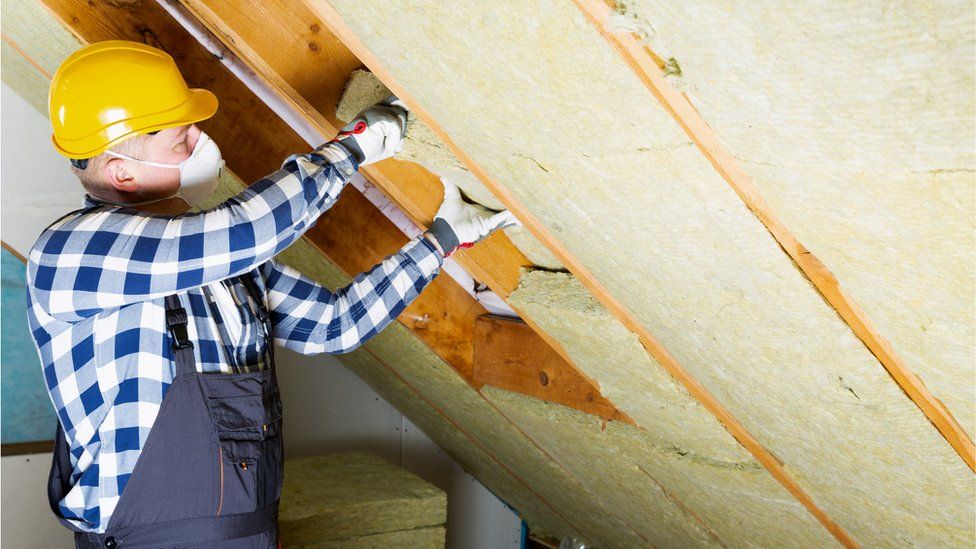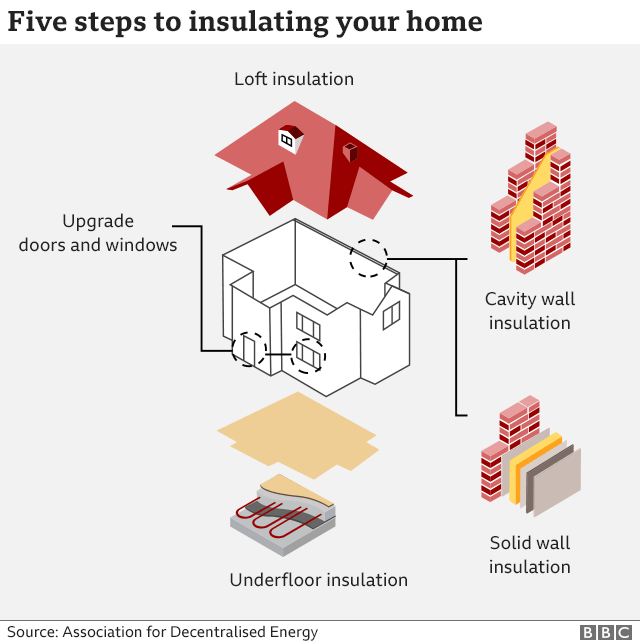
The masterplan to help people upgrade the UK’s homes has been “botched” and must be urgently overhauled, MPs say.
The environmental audit select committee says the Green Homes Grant (GHG), which offers people up to £10,000 for insulation, is so inept that it is actually damaging the building sector.
It adds that 19 million UK homes are poorly insulated and accuses ministers of “failing to grasp” the challenge.
The government says it is “committed to going further and faster”.
But the MPs warn that unless urgent action is taken to improve energy efficiency of homes this decade, the UK will fail to meet its climate targets.
That is because the UK’s housing stock accounts for 20% of its carbon emissions through heating, hot water and cooking.
The MPs said the scheme had “only achieved 10% of its target to improve 600,000 homes in six months”.
It has been rumoured that the Treasury wants to scrap the GHG scheme, but the committee says the system needs to be reformed, not abolished.
And crucially, the MPs insist, the grants need long-term funding so there is time to build a supply chain of materials, and a well-trained workforce.
The government is preparing a Heat and Buildings Strategy, and has previously denied wanting to scrap the scheme.
A spokesman for the Department for Business, Energy and Industrial Strategy (BEIS) said over 33,000 GHG vouchers worth more than £142m have already been issued, helping to improve the energy efficiency of homes.
‘Botched implementation’
The GHG scheme went awry because too many householders were chasing too few installers. There were also delays in the grant payments which have left many installers out of pocket.
The report says: “The impact of botched implementation of the GHG has had devastating consequences on many of the builders and installers that can do the work, who have been left in limbo as a result of the orders cancelled and time taken to approve applications.”
The committee also warns that the government may have underestimated the costs to decarbonise UK homes by 2050, by between £35bn and £65bn.
It says these figures do not include properties with solid walls, or those in conservation areas, which could make energy efficiency installations more challenging – and increase the bill.

“The GHG scheme should not be scrapped or quietly wound down,” said the select committee’s chairman Philip Dunne.
“The government must address the design and administration issues, and all funding not spent by the end of March 2021 should be rolled over into the next financial year.
“Government investment to improve energy efficiency has been woefully inadequate. The £9bn the government pledged at the election was welcome, but 16 months on, there appears to be no plan nor meaningful delivery.”
Brian Berry, from the Federation of Master Builders, told the committee: “The market needs certainty because small companies are not going to invest unless they know there is a long-term market.
“If we want to tackle energy efficiency in our homes, we need to give encouragement to these small companies that this is not just a flash in the pan, it is not going to be a repeat of the previous Green Deal [for housing loans, which was scrapped].
“This is a 20-year programme to transform our existing homes.”
Insulation campaigner Dr Joanne Wade said: “The committee is right to call for a ‘genuine long-term stimulus to the domestic energy efficiency sector’ – it is something that we have repeatedly urged government to do.
“If we don’t do this, we won’t achieve net zero.”
Jess Ralston from the Energy and Climate Information Unit added: “The benefits of getting this right are crystal clear; hundreds of thousands of skilled jobs, lower bills, less carbon and more comfortable homes. The only barrier to climate-proofing our homes is government inaction.
“With a recent litany of policy decisions undermining the UK’s credibility on climate ahead of this year’s crucial COP26 summit, it would be a mistake to add another to the list.”
The BEIS spokesman said: “The UK has a strong track record in improving the energy performance of its homes.
“However, we are committed to going further and faster, and are investing £9bn in improving the energy efficiency of our buildings, while creating hundreds of thousands of skilled green jobs.
“This includes funding for the first hydrogen powered houses and allocating more than £500m this year alone to improve the energy efficiency of 50,000 households in social and local authority housing across the UK, as we work to eliminate our contribution to climate change by 2050.”


